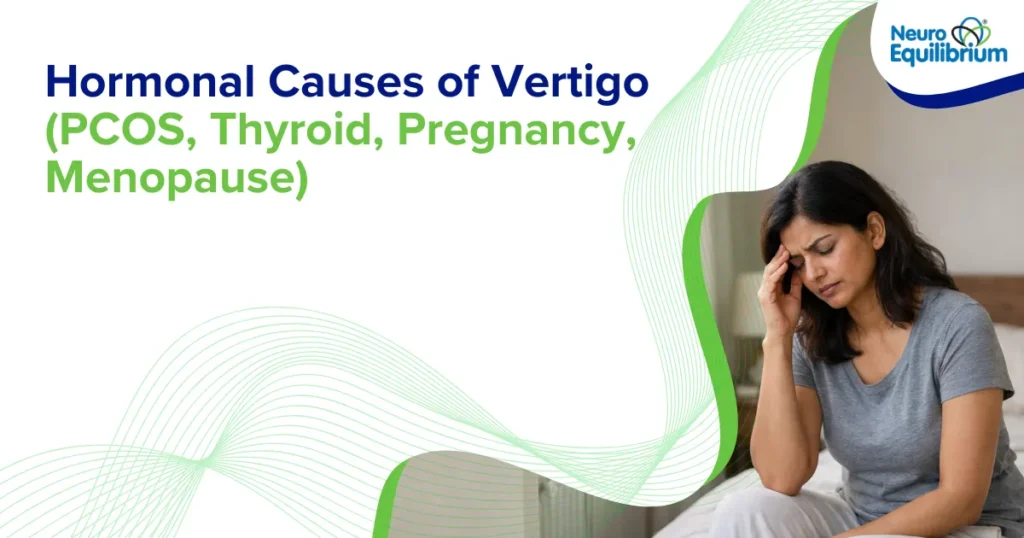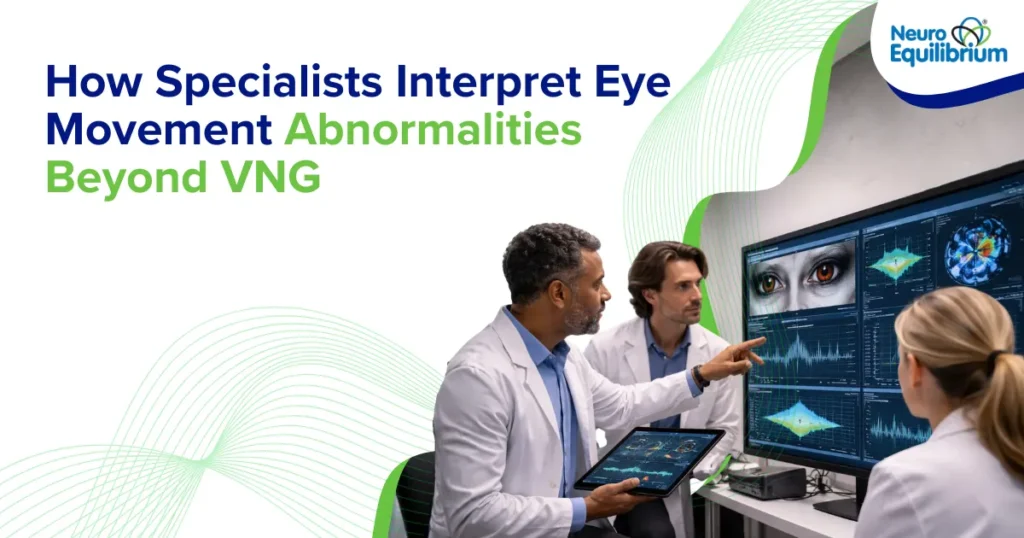Imagine this: You’re dealing with a headache, but it’s not just any headache. It comes with a weird spinning feeling, like the room is moving, or you’re completely off balance. When you experience something like a “spinning headache,” it’s natural to wonder what’s going on. It’s important to understand that feeling like you’re spinning, unsteady, or off balance, often called vertigo, isn’t a disease by itself. Instead, it’s a sign that something else is going on in your body.
When a headache accompanies this spinning sensation, it may indicate a condition called vestibular migraine. But it’s also important to remember there could be other reasons for what you’re feeling. Let’s break it down so you know what to look for and when to get help.
What’s “Normal” for a Migraine?
Most people have a general idea of what a migraine feels like. Often, it involves a throbbing pain, usually on one side of the head. Along with the pain, you might become very sensitive to bright lights, loud noises, or even certain smells. Feeling sick to your stomach or actually vomiting can also happen.
A typical migraine episode can last anywhere from a few hours to a few days. The frequency can vary a lot too. Some people get them rarely, while others might have them several times a month. This is the common picture of a migraine that many people recognize.
Know More About Vertigo
- What is Vertigo? Causes, Symptoms, & Treatment
- Beware of Falls: The Importance of Fall Prevention in Elderly
- Top 3 Essential Vertigo Tests: How to Identify and Manage Balance Disorders
When a Migraine Becomes Concerning?
While migraines are common, there are times when your symptoms might suggest it’s more than just a regular episode. It’s smart to pay attention if there are sudden changes in how your migraines usually behave.
For example, if a headache comes on much more suddenly than usual, is incredibly intense, or starts to feel different than any migraine you’ve had before, that’s worth noting. Also, watch out for new symptoms appearing with your headache that aren’t typical for you, especially if they involve vision changes, weakness, or trouble speaking. These kinds of shifts can be important clues that it’s time to seek medical advice.
The “Spinning” Sensation: Vertigo vs. Dizziness
When we talk about a “spinning” feeling, it’s helpful to distinguish between vertigo and general dizziness. Vertigo is a very specific sensation. It’s the feeling that you, or your surroundings, are actually spinning, moving, or swaying. It’s a very distinct rotational feeling. General dizziness, on the other hand, is a broader term. It might mean you feel lightheaded, woozy, or simply unsteady on your feet without that spinning sensation.
When vertigo is part of your symptoms, especially with a headache, it definitely suggests something more specific might be happening than just a typical headache. It means your body’s balance system is sending out a clear signal that it needs attention.
Vestibular Migraine: A Real Condition
One common reason for that spinning headache is vestibular migraine. This is a specific type of migraine where the main symptom isn’t necessarily a severe headache. Instead, the primary problem is dizziness or vertigo. So, while migraines are well-known for causing headache, they can also show up in other ways, including feeling off balance, dizzy, disoriented, and even causing neck pain. It’s worth knowing that more than 10% of people who get migraines actually experience vertigo and dizziness as their main symptoms.
Here are some things that characterize vestibular migraine:
- Dizzy spells can vary a lot in how long they last, from just a few seconds to several hours, or even days.
- These episodes might or might not come with a headache.
- Often, people also feel nauseous, might vomit, or find it hard to concentrate during an attack.
- Many patients notice they become very sensitive to loud sounds or bright lights, a common migraine trait.
- Feeling motion sick is also a common symptom that goes along with it.
- It can affect anyone, from young children to seniors, though it’s seen more often in people aged 20 to 40 and often seems to run in families.
Certain things can trigger vestibular migraine attacks:
- Not getting enough sleep.
- Missing meals, particularly breakfast.
- Stress.
- Spending too much time looking at screens.
- Some foods like chocolate, aged cheeses, processed meats, artificial sweeteners, monosodium glutamate (MSG), and certain kinds of alcohol (especially red wine).
Other Conditions That Can Mimic or Co-Exist With Vestibular Migraine
While vestibular migraine is a key player, other conditions can either look like migraine symptoms or happen at the same time, also causing dizziness. It’s essential to think about these possibilities:
- Inner Ear Disorders (Peripheral Vertigo): The inner ear is mainly responsible for keeping you balanced.
- Benign Paroxysmal Positional Vertigo (BPPV): It is one of the most frequent causes of vertigo. It occurs when small crystals of calcium carbonate that usually exist in a particular section of your inner ear fall off and float into other sections. These crystals move when your head is moved in some manner, such as getting out of bed, turning over, or bending down, causing brief spinning spells which typically do not lasts more than a minute.
- Meniere’s Disease: This is a condition that is characterized by the pressure of the fluid in the inner ear. It leads to recurrent attacks of vertigo, fluctuating hearing, tinnitus, and the sensation of fullness in one of the ears.
- Vestibular Neuritis or Labyrinthitis: These are brought about by an infection (in most instances, viral) or inflammation. When it impacts the balance nerve (vestibular neuritis) or the inner ear components (labyrinthitis) it may cause extreme spinning, frequently accompanied by vomiting. In labyrinthitis, there may also be a severe or nearly complete hearing loss in one ear.
- Brain-Related Causes (Central Vertigo):
- Acoustic Neuroma: This is a non-cancerous growth that affects the hearing and balance nerve. It can slowly cause hearing loss and unsteadiness over time.
- Less commonly, vertigo can be a symptom of more serious conditions that affect the brain, such as a stroke, multiple sclerosis, or brain tumors.
- Other Body Conditions and Medications:
- Changes in blood pressure, like orthostatic hypotension (where blood pressure suddenly drops when you stand up), can make you feel unsteady, lightheaded, or even cause you to black out. This is pretty common in older people or those taking medicine for high blood pressure or prostate issues.
- Anemia, uncontrolled diabetes, and dehydration can also lead to dizziness.
- Certain medications can increase the chance of falls or cause dizziness. These include sedatives, some blood pressure and diabetes medicines (if the levels are too high or low), “anticholinergic” medicines (used for allergies, overactive bladder, vertigo, nausea, and some antidepressants), and drugs that can harm the ear (like chloroquine, some TB medicines, and certain antibiotics like amikacin).
It is important to note that cervical spondylitis, which is a common age-related condition of the spine, does NOT cause vertigo.
When to See a Doctor (and What Kind)?
Given all the possible reasons for spinning sensations and headaches, getting an exact diagnosis is incredibly important. Vertigo is a symptom that really needs attention and an evaluation by specialized doctors. Just trying to calm the symptoms temporarily with medicines often isn’t enough. A detailed evaluation with specialized tests is needed to find the actual reason behind what you’re feeling and open the door to the best possible treatment.
The process of figuring out what’s wrong usually involves:
- Patient History: A specialist will inquire of your symptoms, the history of your medical conditions, and anything that appears to cause your symptoms.
- Physical Examination: This involves examining your eye movement, your balance, and general nerve functioning.
- Special Diagnostic Tests: This may involve Videonystagmography (VNG), Subjective Visual Vertical (SVV), Dynamic Visual Acuity (DVA), and hearing (Audiometry). The way vertigo is treated must be made just for you, based on what’s causing it.
- For BPPV, specific repositioning maneuvers (like Epley’s, Semont’s, Barbecue, Zuma, or Yacovino) are used to put the displaced crystals back where they belong. This often provides immediate relief.
- For vestibular migraine, managing it often involves changing your lifestyle and diet, along with medical treatment. This might include “migraine prophylaxis” medicines to prevent attacks.
- Meniere’s disease treatment usually involves cutting down on salt and taking medicines to reduce pressure in the inner ear.
- Vestibular Neuritis might be treated with high-dose steroids followed by vestibular rehabilitation.
- Many vertigo and balance issues are treated with Vestibular Rehabilitation Therapy (VRT) that involves specific exercises to improve your balance and stability. It can involve app-based programs or even virtual reality (VR) based rehabilitation to be more engaging and have a more real world feel.
Get Expert Care at NeuroEquilibrium
If you’re experiencing spinning headaches or frequent dizziness, it might seem like just another migraine. But in many cases, these symptoms could point to something more complex, such as a vestibular migraine or an inner ear disorder. These conditions often go undiagnosed, leaving people to manage their symptoms without really understanding what’s going on. If you’re feeling overwhelmed or unsure about what your body is trying to tell you, it’s important to look beyond the surface and find the real cause.This is where NeuroEquilibrium can make a difference. With over 220 clinics across India, we are the largest network of centers dedicated exclusively to vertigo, dizziness, and balance disorders. Our focus is on accurate diagnosis through cutting-edge vestibular testing and expert evaluation. A team of experienced neurologists and ENT specialists collaborates to design a personalized treatment plan that offers long-term relief. If you’re tired of spinning headaches taking over your life, a visit to NeuroEquilibrium can help you get the clarity and care you need to start feeling like yourself again.
Sources
- National Institute of Neurological Disorders and Stroke (NINDS). (2025). Migraine. https://www.ninds.nih.gov/health-information/disorders/migraine (ninds.nih.gov)
- “Vestibular Migraine.” Johns Hopkins Medicine. https://www.hopkinsmedicine.org/health/conditions-and-diseases/vestibular-migraine (Johns Hopkins Medicine)
- “Dizziness and Vertigo – Ear, Nose, and Throat Disorders.” MSD Manuals. https://www.msdmanuals.com/home/ear-nose-and-throat-disorders/symptoms-of-ear-disorders/dizziness-and-vertigo (MSD Manuals)
- “What’s Causing My Headache and Dizziness?” Healthline. https://www.healthline.com/health/headache-and-dizziness (Healthline)
- “Head Pressure and Dizziness: Causes, Treatment, and More.” Medical News Today. https://www.medicalnewstoday.com/articles/head-pressure-and-dizziness (Medical News Today)
- “Headache or Migraine? How to Tell the Difference.” Medical News Today. https://www.medicalnewstoday.com/articles/324890 (Medical News Today)
FAQ’s
What is a spinning headache?
A spinning headache is commonly used to refer to vestibular migraine, in which the main complaint is dizziness or vertigo as opposed to or in addition toa general headache.
Can migraines cause vertigo or dizziness?
Yes, there is a form of migraine called vestibular migraine, the primary symptom of which is dizziness or a sensation of spinning, sometimes without any signs of headache.
How do I know if it’s vestibular migraine or something else?
Vestibular migraine may involve vertigo, nausea, photophobia, phonophobia, and balance problems. Clinical analysis and testing is necessary to achieve accurate diagnosis.
What are other causes of dizziness with headaches?
In some cases, dizziness accompanied by headaches may be linked to conditions like Benign Paroxysmal Positional Vertigo (BPPV), inner ear infections, or Ménière’s disease. More rarely, serious neurological conditions such as a stroke or brain tumor could be the underlying cause. These possibilities are typically identified through detailed medical evaluations and advanced diagnostic tests.
Where can I get tested for vertigo and vestibular migraine?
You can get tested at NeuroEquilibrium, the world’s largest chain of clinics for vertigo, dizziness, and balance disorders, with over 220 centers across India. We use advanced vestibular diagnostics like VNG, vHIT, and posturography, combined with expert evaluation by neurologists and ENT specialists, to accurately diagnose and treat conditions like vertigo and vestibular migraine.
















